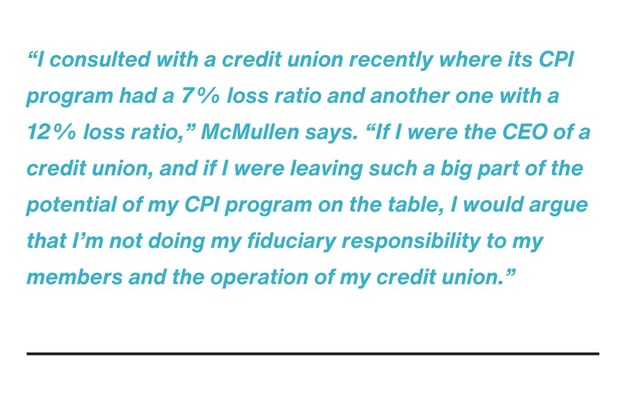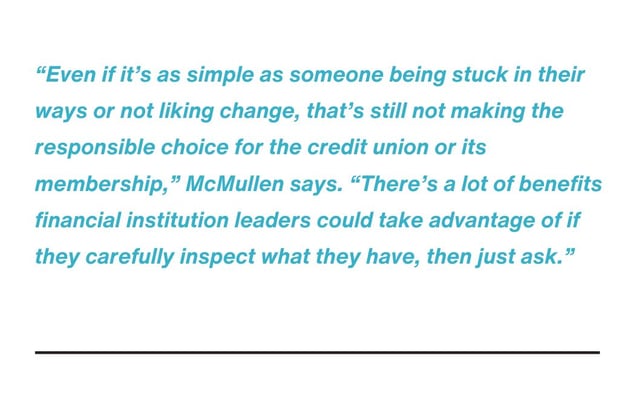Leveraging Partnerships for Better Outcomes
If you are reading this, you already know that, as a financial institution owned by its members, a credit union has a fiduciary responsibility to always act in the membership’s best interest, prioritizing their financial wellbeing over its own profits or the interests of any third parties.
The subject of fiduciary responsibility is by its nature complicated and multilayered, but to keep it to its simplest meaning we can look to the words of the NAFCU: “While there are numerous responsibilities a fiduciary must undertake, these generally boil down to two main duties: loyalty and reasonable care.”
To ensure they are properly fulfilling these fiduciary duties, credit union leaders typically consult with a variety of stakeholders — but there’s one source of assistance they might not have considered.

Who Can Help
To ensure they are properly fulfilling these duties, credit union CEOs, VPs, and Directors typically consult with a variety of stakeholders, including legal and financial advisors, the credit union’s management team, auditors, and other experts in the field.
Other resources that can help keep leadership up to date on regulatory requirements, current issues, and emerging industry trends include agencies like the NCUA and CUNA, state and regional credit union leagues, and other organizations such as industry publications, specialized credit union consulting firms, and nonprofits like Filene Research Institute.
But did you know there is an additional resource you can leverage in this area — and it’s right under your nose?
An Often-Overlooked, Yet Valuable, Resource
There’s another source credit union leaders can turn to for support with this crucial responsibility they might not have previously considered: their business partners and vendors. Because they provide products and services that credit unions rely on to offer members a full range of financial services, these outside companies often have significant insight into best practices, regulatory pitfalls, member behavior, and new technologies.
To explore this idea, let’s use insurance tracking and collateral protection insurance as an example.
As a trusted partner to hundreds of credit unions of all sizes from coast to coast for the past 50 years, State National Companies has had a front-row seat for just about every scenario imaginable related to collateral and portfolio protection. We have been around long enough to see what happens when a CPI program is run well — and, unfortunately, what happens when one is run poorly or with the wrong priorities.
Tales From The Field
Brian Barrett and Joe McMullen, divisional vice presidents at State National, have more than 22 years in the CPI industry and have worked with hundreds of credit unions across the United States.
Here, they share six aspects of fiduciary responsibility that can all too easily be overlooked and ways in which smart business partnerships and providers that are invested in the credit union’s success can help.
- Staying up to date with technology as a fiduciary responsibility.
Although most credit unions recognize the importance of staying up to date with digital and other technologies to remain competitive, historically they have been challenged to remain on the cutting edge.
However, in today’s environment, keeping up with and investing in the latest technology can be considered a fiduciary responsibility of a lending institution. How so? Because it can lead to cost savings and increased efficiency, a competitive advantage, and better risk management.
Vendors and business partners can assist in this area by bringing to the table the technology they already have invested in, versus each credit union having to make those expenditures themselves.
An example of this when it comes to collateral protection is AI-based tracking technology that monitors the insurance status of a credit union’s borrowers in real time, accomplishing thousands of queries and updating records in seconds — something that would not be feasible for most credit unions to do on their own.
In this way, a credit union can benefit from huge technology investments without having to make the investments itself. - The importance of being responsible to not only individual members but also the whole membership.
Credit unions are, by definition, dedicated and committed to the financial wellbeing of their members. However, sometimes being fiscally responsible and looking out for the best interests of their membership as a whole must take precedence over the wishes of an individual member.
In reality, credit unions follow this principle every single day. For example, you might need to deny a loan to an individual member who doesn’t meet your credit union’s lending criteria, even if that individual has been a long-time member. To follow your sound underwriting guidelines, you have de facto decided that approving the loan could put the credit union and the membership as a whole at risk if the member is unable to repay the loan.
A similar principle applies to collateral protection, says Barrett.
“Assuming it is a well-run, reputable program with the right tools and service levels, what makes CPI a responsible choice and more fair to a credit union’s whole membership is that it only affects the 1% of members who don’t fulfill their responsibility to maintain valid insurance coverage, not the 99% of borrowers who are compliant to the terms they agreed to in their loan contract," he explains.
- Compliance and regulation.
Just as with technology, credit unions, particularly smaller ones, can find it challenging to keep up with the latest in compliance and regulation. Yet, strict adherence in this area is one of the most important fiduciary responsibilities a credit union has.
Credit unions already do a lot to maintain proper adherence with ever-evolving regulatory changes and compliance issues through specialized software programs, compliance management systems, and guidance and training from industry associations and regulatory agencies. Well, guess what? Good, collaborative vendor partnerships can help here as well.
For example, transparency is key when partnering with vendors in compliance efforts. Look for partners who ensure your credit union has access to the same real-time data and metrics they do, fostering alignment and informed decision-making.
With CPI specifically, engaging with a provider who is its own registered “A”-rated insurance company versus working with third parties as a broker can help ensure compliance is always top of mind, due to the increased regulatory scrutiny an insurance company faces. - Cyber and data security.
Similar to staying up to date with compliance and regulation, staying current with ever-evolving data breach and security threats requires a lot of resources, both financial and personnel-wise. This is an area where your vendors and business partners can be either a huge ally or a possible threat.
Credit unions must ensure the organizations they work with employ impeccable controls and processes. One area to look for in both current and prospective partners is how proactive they are with due diligence information. Are they voluntarily offering a due diligence packet before you ask because they are fully comfortable with their strength in this area? Or do you have to ask multiple times before you receive this information?
Additionally, look for partners who can demonstrate advanced security measures, such as multifactor authentication (MFA) on platforms where your members interact. MFA provides an extra layer of defense by requiring users to verify their identity through more than just a password before gaining access. This added safeguard helps ensure that sensitive credit union and member data remain protected from unauthorized access or potential breaches.
A partner's commitment to robust security features such as MFA reflects their dedication to protecting you and your members. - Getting the full benefit out of every partnership you have with your vendors.
“Dust off your contracts and make sure you are getting the full value out of everything you possibly can from the relationship with your current providers,” McMullen says. “Are you receiving all the benefits you expected when you signed up with them?”
This is an area where a vendor or business partner’s true values become apparent. Are they looking out for the best interests of your credit union as much as they are their own success? Or do they seek to extract the most profit for themselves regardless of credit union results?
In the area of CPI, another example is whether a provider automatically pays all types of claims so the credit union receives the maximum in claim dollars it is entitled to — versus a provider that leaves that labor to credit union staff, “forgetting” to let them know they are leaving money on the table if they don’t know to file for all the claim types they are eligible for.
Also, in contrast to the stereotype of an insurance company that never wants to see a dollar in claims leave its building, a CPI provider that practices positive underwriting can contribute greatly toward the financial health of a credit union.
“If we have a credit union with a 10% loss ratio that is generating sufficient premium, we would come in and proactively say, ‘Hey, your certificate rate is X% today, and we can drop it several percent,’” McMullen explains.
“We would employ our dedicated service model to make sure our service people are doing a deep dive into every possible claim situation they had,” Barrett adds. “Are they filing all the claims? Does their staff need some additional training? We always work with each credit union to make sure they’re getting the full value out of their program.”
- A duty for leadership to engage with vendors and other partners offering the best overall benefit to the membership.
When meeting with credit unions to review their portfolio protection options, McMullen sometimes runs across someone in a leadership position who might unintentionally be making decisions that aren’t the most beneficial to their credit union or their membership. They might have a long-term personal relationship with a vendor or some other factor that causes them to enter or keep agreements when their membership would actually be better served by exploring a different alternative.
This can often get missed in the day-to-day busy-ness of operations and an “if it’s not broke, don’t fix it” mindset.
It is in their members’ best interest for credit union leaders to review all their relationships and contracts regularly. If a side-by-side comparison shows an overall deal that is better for the credit union and membership, it is the fiduciary responsibility of credit union decision-makers to be sure they are exploring options that would make for a stronger, more effectively operating credit union.
Ultimately, the goal of all parties that touch a credit union’s membership in any way should be to ensure the credit union is upholding its fiduciary responsibilities at all times. By inquiring into and considering the vendors’ perspectives, credit union directors can ensure the credit union’s partnerships align with its values, help fulfill its mission, and serve the best interests of members.
A true, consultative partner to your credit union can offer valuable insights and expertise you can leverage to enhance your credit union’s fiduciary practices and maintain your members’ trust.
Click here to explore the path to enhanced fiduciary responsibility and partnership success.
*State National is a preferred partner of Callahan & Associates. A previous version of this article first appeared on creditunions.com.

